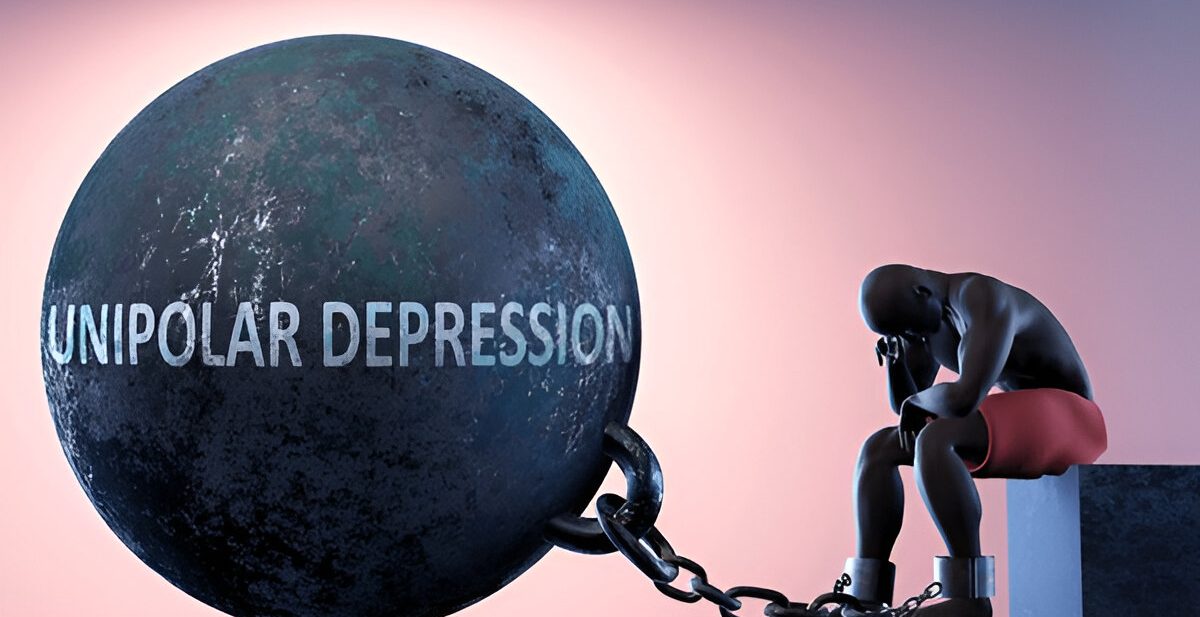- February 18, 2025
- by Harshita Bajaj
- Depression
Depression is one of the most widespread mental health issues, globally affecting 280 million people. However, there are different types of depression, differing in mood symptoms and treatment approaches. It is essential to know the form and type of a particular disorder to accurately formulate a treatment plan and therapeutic intervention.
Unipolar Depression Meaning & Definition
Unipolar depression is also known as Major Depressive Disorder (MDD), which has all symptoms of depression, such as persistent low mood and loss of interest in activities, hopelessness and helplessness, negative thoughts, changes in sleep and appetite, and no presence of episodes of mania. Usually, it is differentiated from bipolar depression and seasonal affective disorder by healthcare professionals.
Symptoms of Unipolar Depression as per ICD 10
According to ICD 10 the symptoms of unipolar depression are divided into core symptoms and additional symptoms.
The core symptoms are:
- Persistent low mood- Sadness, hopelessness and empty almost regularly
- Loss of interest or pleasure (Anhedonia)- Inability to enjoy activities that were previously enjoyable.
- Decreased energy (Fatigue)- Significant lack of energy and increased tiredness.
The additional symptoms are:
- Lack of concentration/attention- Difficulty focusing, making decisions or staying organised.
- Low self-esteem or self-confidence- Feeling inadequate, worthless or overly critical of oneself.
- Feelings of guilt/ worthlessness- Excessive guilt or self-blame, often disproportionate to the situation.
- Disturbed sleep- Insomnia (difficulty falling asleep) or hypersomnia (excessive sleeping).
- Changes in appetite or weight- Loss of appetite and weight or over eating leading to weight gain.
- Psychomotor agitation- Observable restlessness or slowed movements and speech.
- Suicidal thoughts or behaviours- Recurrent thoughts of death, suicidal ideation or suicide attempts.
Unipolar depression vs Bipolar depression
Unipolar depression and bipolar depression are two distinct types of mood disorders, but there are some similarities in symptoms. Unipolar depression refers to depression without mood swings or episodes of mania or hypomania, it is characterised by depressive symptoms and low mood.
On the other hand, Bipolar depression refers to depression which alternates between depressive episodes, which is characterised by low moods, negative thoughts and loss of interest in carrying out activities; and manic states, which is characterised by extreme energy, euphoria, risky behavior, and high impulsivity.
Hence, the key difference between unipolar and bipolar depression is the presence of manic episodes. Unipolar depression or Major Depressive Disorder (MDD) impacts approximately 8.3% of the population whereas bipolar affects approximately 4.4% of the population in United States.
However, sometimes even for mental health professionals it can be difficult to distinguish unipolar and bipolar depression, as it can also manifest as depression with a manic episode or bipolar disorder with a depressive episode.
Types of Unipolar Depression
Unipolar depression often serves as an umbrella term for all the different types of depression that specifically have only one mood state. Hence, these are the types of unipolar depression:
- Persistent Depression or Dysthymia or Chronic Depression referring to depression lasting at least for 2 years
- Seasonal Affective Disorder (SAD), which is MDD with a seasonal pattern, specifically relating to seasonal changes
- Postpartum Depression, a type of depression which has an onset after pregnancy
- Situational Depression or Reactive Depression, typically occurring within 3 months after a stressful or traumatic event
Unipolar Depression Treatment
Unipolar depression is majorly treated with a combination of medications, psychotherapy and lifestyle changes. The most effective treatment plan always depends on the severity of symptoms, individual history and personal preferences.
Pharmacotherapy
- First line treatment includes antidepressants that help balance brain chemicals such as Selective Serotonin Reuptake Inhibitors (SSRIs) (for example, fluoxetine, sertraline, escitalopram), Serotonin-Norepinephrine Reuptake Inhibitors (SNRIs)(example, venlafaxine, duloxetine), Atypical Antidepressant (example, bupropion, mirtazapine), Tricyclic Antidepressants (TCAs) (such as amitriptyline, nortriptyline); Monoamine Oxidase Inhibitors (MAOIs) (Used when other treatments fail such as phenelzine).
- In the case of Bipolar depression, the treatment medication would focus on mood stabilizers and antipsychotics.
Therapeutic Intervention
- Cognitive Behavioural Therapy (CBT)- It helps to deal with the negative thought patterns and resulting actions.
- Interpersonal Therapy- It focuses on relationships and emotional processing.
- Behavioural Therapy- It helps in encouraging positive behaviours to improve mood.
- Psychodynamic therapy- It explores past experiences and unconscious ideas to understand the root cause and treat it.
Lifestyle and self-care
- Exercise– It helps to improve mood, increase serotonin and reduce symptoms.
- Healthy Diet– A balanced diet can support mental health.
- Sleep Hygiene– A healthy sleep cycle helps to regulate mood.
- Mindfulness and Meditation– These techniques help in managing stress and adopting effective coping mechanisms.
- Social Support– Engaging with family, friends and support groups is essential to the treatment process.
Understanding the differences between unipolar depression and bipolar depression are essential to the diagnosis process, intervention planning and monitoring the progress of the individual. While unipolar depression involves a persistent low mood, bipolar depression involves both depressive and manic mood episodes. Recognizing these differences are the first step towards ensuring that each individual receives appropriate and relevant care and mental health support. If you or someone you know is struggling with depression, encourage them to seek professional support by searching for therapist near me as it is the first step towards healing and treatment. At NABHS, we help you get the right information and keep you empowered on this journey!
For the most trusted sources!
















